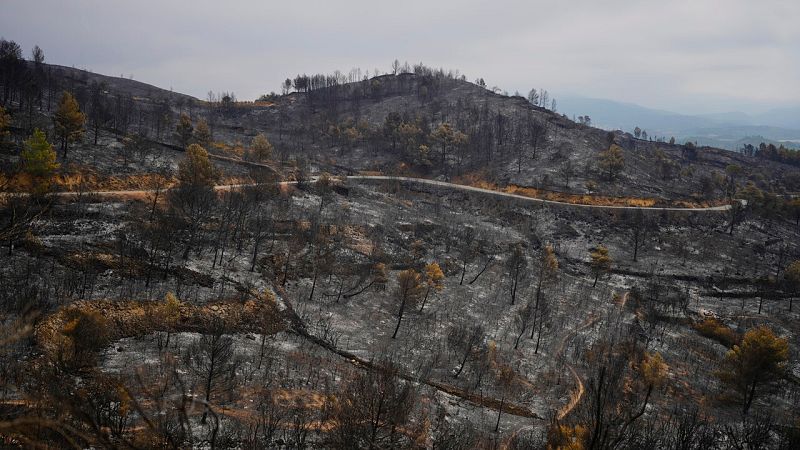Wildfires Scorch Southern Europe as Temperatures Soar

Wildfires Continue to Challenge Firefighters Across Southern Europe
Firefighters across southern Europe are working tirelessly to combat wildfires as the region experiences extreme heat and record-breaking temperatures. The situation has become increasingly dire, with multiple countries facing large-scale blazes that threaten both lives and property.
In France, approximately 1,400 firefighters were deployed in the Aude region on Saturday to prevent the country’s largest wildfire in decades from reigniting. Residents who had been evacuated were allowed to return to their homes after the fire was contained since Thursday. The blaze, which burned over 160 square kilometers in a wooded area known for its vineyards, left one person dead and 25 injured, including 19 firefighters. Despite containment efforts, authorities have issued a strict ban on forest access, as the risk of re-ignition remains high.
The fight against the fire is expected to continue for several weeks, with several hotspots being closely monitored. Col. Christophe Magny, director of the Aude firefighters department, emphasized that the fire will not be fully extinguished soon. High temperatures are anticipated in the coming days, complicating the efforts of firefighting teams.
Meteo France has placed the southern half of the country under a "high vigilance" alert for heat waves, with temperatures expected to reach up to 39°C in the Aude region on Saturday. This intense heat is exacerbating the challenges faced by firefighters, making it harder to control the spread of the fire.
Fires Spread Across Spain and Greece
Wildfires are also ongoing in Spain and Greece, where high temperatures continue to increase the risk of further blazes. In Avila province, central-western Spain, an active wildfire began on Friday afternoon, prompting the Spanish Military Emergencies Unit (UME) to work through the night to bring it under control. The fire posed a threat to roads and train lines, with temperatures reaching close to 39°C in parts of Spain and Portugal.
Spain's national weather service, AEMET, has warned that the current period of extreme temperatures is expected to continue until at least next Wednesday. In Greece, a large wildfire erupted in Keratea, about 40 kilometers southeast of Athens, causing significant damage to homes and claiming one life. Authorities issued evacuation orders as the fire approached residential areas, while firefighters battled strong winds to contain the blaze.
At least 260 firefighters, supported by 77 vehicles, were working to control the fire, with numerous volunteers and civilians assisting in the affected areas. The situation remains critical, with ongoing efforts to prevent further destruction.
Wildfires in Turkey Under Control
In Turkey, wildfires in the central districts of Canakkale and the Bayramic area in western Turkey have been largely brought under control, according to Agriculture and Forestry Minister Ibrahim Yumakli. Firefighting teams worked throughout the night to halt the advance of the blazes, which broke out near Yigitler village and spread to a forested area under strong winds.
Precautionary evacuations were carried out in the villages of Sacakli, Ahmetceli, Doganca, Zeytinli, and Pitirelli, with a total of 654 residents relocated to safe zones. Authorities reported that four suspects have been taken into custody as part of the ongoing investigations into the cause of the fires.
A New Normal: Climate Change and Wildfires
Southern Europe has seen multiple large fires this summer, and scientists warn that climate change is increasing the frequency and intensity of heat and dryness, making the region more vulnerable to wildfires. The UN World Meteorological Organisation (WMO) released a report highlighting the impact of extreme heat worldwide, noting that approximately 489,000 heat-related deaths occurred annually between 2000 and 2019, with 36% occurring in Europe.
This record-breaking July saw Turkey record an extreme new national high of 50.5°C, while Sweden and Finland experienced unusually long spells of temperatures above 30°C. The WMO warns that countries must act faster to adapt to climate change and limit global warming, aligning with the 2015 Paris Agreement.
“Extreme heat is sometimes called the silent killer, but with today’s science, data and technologies, silence is no longer an excuse. Every single death from extreme heat is preventable,” said WMO Deputy Secretary-General Ko Barrett.
The organisation estimates that scaling up heat-health warning systems in 57 countries alone could save nearly 100,000 lives annually. “This is not just a climate issue, it’s a public health emergency,” said Joy Shumake-Guillemot, lead of the WHO-WMO Climate and Health Joint Programme and co-lead of the Global Heat-Health Information Network (GHHIN).

Comments
Post a Comment